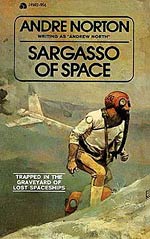
![]() chuhl
chuhl
10/20/2012
![]()
"WORLDS FOR SALE!
That was the startling cry that electrified Dane Thorson of the space-trader Solar Queen. It was his first trip and the cosmic auction was taking place at an isolated port of call, far out in the Milky Way.
Who'll buy this newly-discovered planet? The data on it sealed -- you may be getting a radioactive desert, you may be buying a fabulous empire, or you may be stuck with an untracked unconquerable jungle. And Dane and his fellow spacemen took the risk. They bought a planet, sight unseen, whose ominous name was ... Limbo!"
If you can resist a blurb like that, you're made of sterner stuff than I am. I read that page in my used book store and snapped up Sargasso of Space right away.
The hero of the story is Dane Thorsen, an apprentice cargo-master about to receive his first assignment in space. In a scene oddly prescient of the Sorting Hat scenes in Harry Potter, Dane and his classmates wait anxiously while a computer called "The Psycho" assigns them to a ship based on their compatibility with the current crews. Dane draws the Solar Queen, a Free Trader, which means an uncertain career of high risk and potentially high rewards -- or poverty.
Andre Norton does a great job setting up the culture of the Traders and the state of the galaxy. She doesn't just give it to you all at once a massive infodump -- she doles out intriguing hints here and there as the story unfolds. That goes a long way towards making Dane's galaxy seem textured and real, a place that exists beyond the confines of this one story. She's obviously put a lot of thought into her worldbuilding. I don't know if that's because she planned from the start to make Sargasso of Space the first of a series of books, or if that's her writing style in general (this is my first time reading Norton), but it's very effective.
In the same way, she's clearly devoted a lot of thought to the crew of the Solar Queen. They're a multiethnic crew, in the spirit of Star Trek's Enterprise, but 11 years earlier. There are no stereotypes on display here. The only person Dane has a problem with is his Arab crewmate, and even then, it's because he's so good-looking and self-assured that Dane feels intimidated by him. By the end of the story, the Japanese cook, a versatile man of quiet strength, unexpectedly emerges as the leading authority figure and mentor for Dane.
But with all that going for it, I still felt a bit disappointed by Sargasso of Space. The setup was so good that I was frustrated that Norton didn't do as much with it as I had hoped. Not long after the Solar Queen is grounded on the planet Limbo, the story is, too. It reminded me of the kind of story I used to read in Boys' Life, the Boy Scouts magazine that featured tales of plucky, resourceful young men having adventures in the great outdoors. There was too much wandering back and forth on the planet's surface, too much description of the terrain, too much activity that could have been featured in a contemporary adventure story or even a Western. I wanted more science fiction bang for my buck.
At one point, Dane and his crewmates find some alien corpses, and I thought Norton was foreshadowing encounters with the living aliens later in the book, but they never show up. Since the novel is called Sargasso of Space, I expected marooned spacecraft to be a prominent part of the story. Dane and his friends discover two derelict spacecraft, one of them ancient. I would have thought that Norton would seize the opportunity to write some very dramatic set pieces in which they explore these derelicts. Instead, they make only brief, perfunctory examinations. I think Norton missed some promising opportunities for science fiction adventure there, instead focusing on the Boys' Life kind of story. She gives us tantalizing hints about the Forerunners, a race antedating humanity that seems to have wiped itself out long before man achieved spaceflight, and Dane and his friends wander through their ruins, but they never learn much about them. (Maybe Norton saved them for the sequels?)
That's my main problem with Sargasso of Space. Norton dropped all those tantalizing hints that made me eager to discover more, but instead of following them up, she gives us a rather conventional boys' adventure story. And it did feel like a young adult story. I felt like I was reading below my grade level, in a way that I don't when I read Heinlein's juveniles.
Nevertheless, this book made me want to read more of Andre Norton's work. Maybe I should the other books in the series to see if Norton developed the hints that I found so promising.